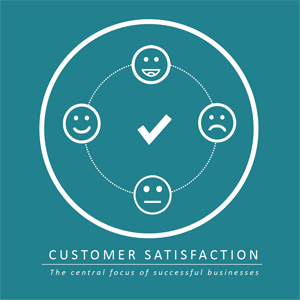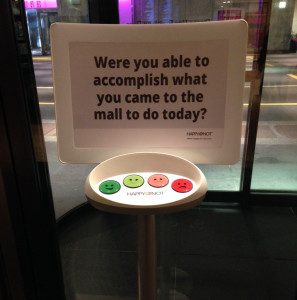 Customer satisfaction, enhanced customer experience, customer relationship management – whatever name you give it, the concept has been the central focus of successful businesses for many years. An entire industry is dedicated to measuring, calibrating, communicating, providing data mining and identifying those consumers who come into contact with a brand’s product or service. According to its sponsors, Advocamp was the first conference dedicated to customer advocacy. The reason for all this attention is simple: satisfied, happy and appreciated customers are one of the most profitable, loyal and lasting assets a brand can have. The statistics speak for themselves:
Customer satisfaction, enhanced customer experience, customer relationship management – whatever name you give it, the concept has been the central focus of successful businesses for many years. An entire industry is dedicated to measuring, calibrating, communicating, providing data mining and identifying those consumers who come into contact with a brand’s product or service. According to its sponsors, Advocamp was the first conference dedicated to customer advocacy. The reason for all this attention is simple: satisfied, happy and appreciated customers are one of the most profitable, loyal and lasting assets a brand can have. The statistics speak for themselves:
- Happy customers have a lifetime value (LTV) 46% higher than others
- They are 3X more likely to recommend to a friend through word-of-mouth (WOM)
- They contribute 20% more to a company’s profitability
- They will defend a brand if it comes under attack
The guru of this multi-million dollar Customer Satisfaction Industry is Fred Reichheld of Bain Consulting, who developed the Net Promoter Score (NPS) – over 40 years ago. His book, “The Ultimate Question 2.0” is the definitive guide to how to get and keep happy customers, and measure their impact on the bottom line. Reichheld was the keynote speaker at the Advocamp conference which focused on how to identify and parlay customer advocates into lifelong assets.
 He singled out Apple Computer and Enterprise Car Rental as two of the most successful practitioners of NPS. These firms are committed to using their customers’ feedback on a weekly basis to fine tune their service, recognize star employees and identify staff that needs additional training. He contends that this focus contributes significantly to Apple’s market cap of $735 billion and Enterprise Car Rental’s market position as the largest vehicle transportation company in the world. Given the proven success of utilizing customer feedback and most importantly, acting upon it, you would assume that most major brands would incorporate this strategy in their day-to-day operations. Sadly, that is still not the case. After Reichheld’s pioneering research and the success achieved by many Fortune 1000 companies applying the principles, the majority of brands have not yet instituted measurable, defined metrics for gauging the impact of customer satisfaction.
He singled out Apple Computer and Enterprise Car Rental as two of the most successful practitioners of NPS. These firms are committed to using their customers’ feedback on a weekly basis to fine tune their service, recognize star employees and identify staff that needs additional training. He contends that this focus contributes significantly to Apple’s market cap of $735 billion and Enterprise Car Rental’s market position as the largest vehicle transportation company in the world. Given the proven success of utilizing customer feedback and most importantly, acting upon it, you would assume that most major brands would incorporate this strategy in their day-to-day operations. Sadly, that is still not the case. After Reichheld’s pioneering research and the success achieved by many Fortune 1000 companies applying the principles, the majority of brands have not yet instituted measurable, defined metrics for gauging the impact of customer satisfaction.
While NPS may be the most recognized version of customer satisfaction methodologies, there are many similar programs ready to be instituted. If the results of obtaining direct, actionable data can be reflected in the bottom line, what holds organizations back from adding NPS-like initiatives immediately? According to conference speaker Nick Mehta, CEO of Gainsight, the answer lies with the CFO. They still tend to operate in the world of FASB metrics. Meaning, if it cannot be quantitatively measured according to standard accounting rules, such programs can have a very difficult time gaining C-suite buy-in which translates into funding in the annual budget.
Many conference attendees agreed with the speaker’s premise that those organizations which fail to adopt meaningful customer feedback initiatives will never reach their full potential. The technologies and methodologies for listening to the Voice of the Customer (VOC) and responding appropriately are plentiful. It just seems that the will to use them properly takes time.
Do you have a favorite customer feedback solution you would recommend?

Principal
Engaging your customers is at the heart of successful marketing programs. For more than 20 years, Cheryl has been building and executing content and thought leadership strategies designed to do just that. She is excited to be applying that well-honed skill to a help companies like Microsoft, Cisco, 3M, Intel, Capital One and Barclaycard tap into their stakeholder communities and build sophisticated content strategies.
Her experience base spans a range of industries – from technology and financial services to retail, travel, consumer products and healthcare. Cheryl has served as an integral member of her clients’ marketing teams, providing counsel on marketing and brand strategy, thought leadership, media relations, product introductions, and event management.
Prior to joining ComBlu, Cheryl spent 10 years leading corporate marketing for large, complex organizations.
